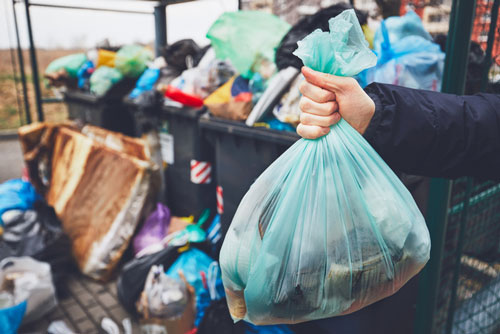“Waste not, want not” are wise words…but there are times when you shouldn’t follow them.
If you hang on to certain items for too long, they can harm your health.
Here are seven things that you should toss before they hurt you:
1. Old sneakers. Paul Langer is a podiatrist and a clinical professor at the University of Minnesota. He points out that the cushioning on athletic shoes deteriorates quickly.
“The shoe wears out in the area where we overload it,” he says. So the part where you need the most support isn’t there. That can lead to knee problems, tendonitis, shin splints, and heel pain. It also raises your risk of twisting an ankle or causing a stress fracture.[1]
Professor Langer recommends replacing sneakers every six months to a year.
2. An old cutting board. Over time, a cutting board will acquire more and deeper scratches and cuts. Marianne H. Gravely is a food safety expert at the USDA. “If there are a lot of cracks in it, it’s time to throw it out,” she said. That’s because bacteria such as Salmonella can accumulate in crevices. And it can be difficult to clean them out.[2]
3. Nonstick pans. Chemical compounds called PFAS are often in Teflon and other nonstick coatings. The Environmental Protection Agency says studies indicate that one common PFAS called GenX is linked to cancer. And ingestion of GenX could affect the immune system, kidneys, blood, and liver.[3]
Throw out PFAS-infused pans. Use cast iron, stainless steel, glass, ceramic, or stoneware instead.
4. Old plastic containers. Don’t use containers made of transparent, hard plastic that are stamped with a 7 or “pc.” Those containers are likely to have BPA. It’s an industrial chemical linked to infertility, heart disease, and diabetes. Use glass containers instead.[4]
5. Old contact lens cases. They are a common cause of eye infections. You should replace your lens case at least once every three months. Cleaning won’t stop a film from building up that draws germs and grime. Failing to change out your lens case puts you “at risk for a potentially serious eye infection,” says ophthalmologist Dr. Thomas Steinemann.[5]
6. Air fresheners. Most air fresheners contain chemicals such as phthalates. These compounds are associated with cancer. They can also disrupt your endocrine system. That can lead to hormone imbalances which can affect everything from sexual function to sleep quality and heart rate. You can substitute air fresheners with a mix of essential oils and water in a spray bottle. Citrus fruit peels placed in a bowl also work well.[6]
7. Receipts. Plastic bottles aren’t the only things with BPA. Receipts have them, too. When you handle receipts, you can absorb this harmful chemical through your skin. Avoid taking receipts from cashiers and throw out any you have lying around the house. Wash your hands immediately after handling them. Use electronic receipts instead.[7]
Editor’s Note: If you’re concerned about exposure to the toxic chemicals that are all around us, you need the Toxin Flush Protocol. It’s a detailed plan to help remove toxins from your system. You can get it in Independent Healing, your best source for evidence-based health advice. Go HERE to subscribe.
Related Articles
Beware of What’s Lurking in Hotel Pools
Toxic Chemicals in Your Mac and Cheese
Every Time You Go Into a Store, You Walk Out With Toxic Waste
Like this Article? Forward this article here or Share on Facebook.
[1]https://www.seattletimes.com/life/outdoors/how-to-tell-its-time-to-throw-out-your-shoes/
[2]https://www.health.com/home/kitchen-decluttering-food-safety
[3]https://apnews.com/fd5a769eb0324980a94580814581a373
[4]https://www.health.com/health/gallery/0,,20892663,00.html?slide=137526#137526
[5]https://www.health.com/health/gallery/0,,20892663,00.html?slide=114126#114126
[6]https://www.slice.ca/beauty/photos/things-to-throw-out-for-better-health/#!room-freshener-pexels-nicole
[7]https://www.ncbi.nlm.nih.gov/pubmed/30623888

